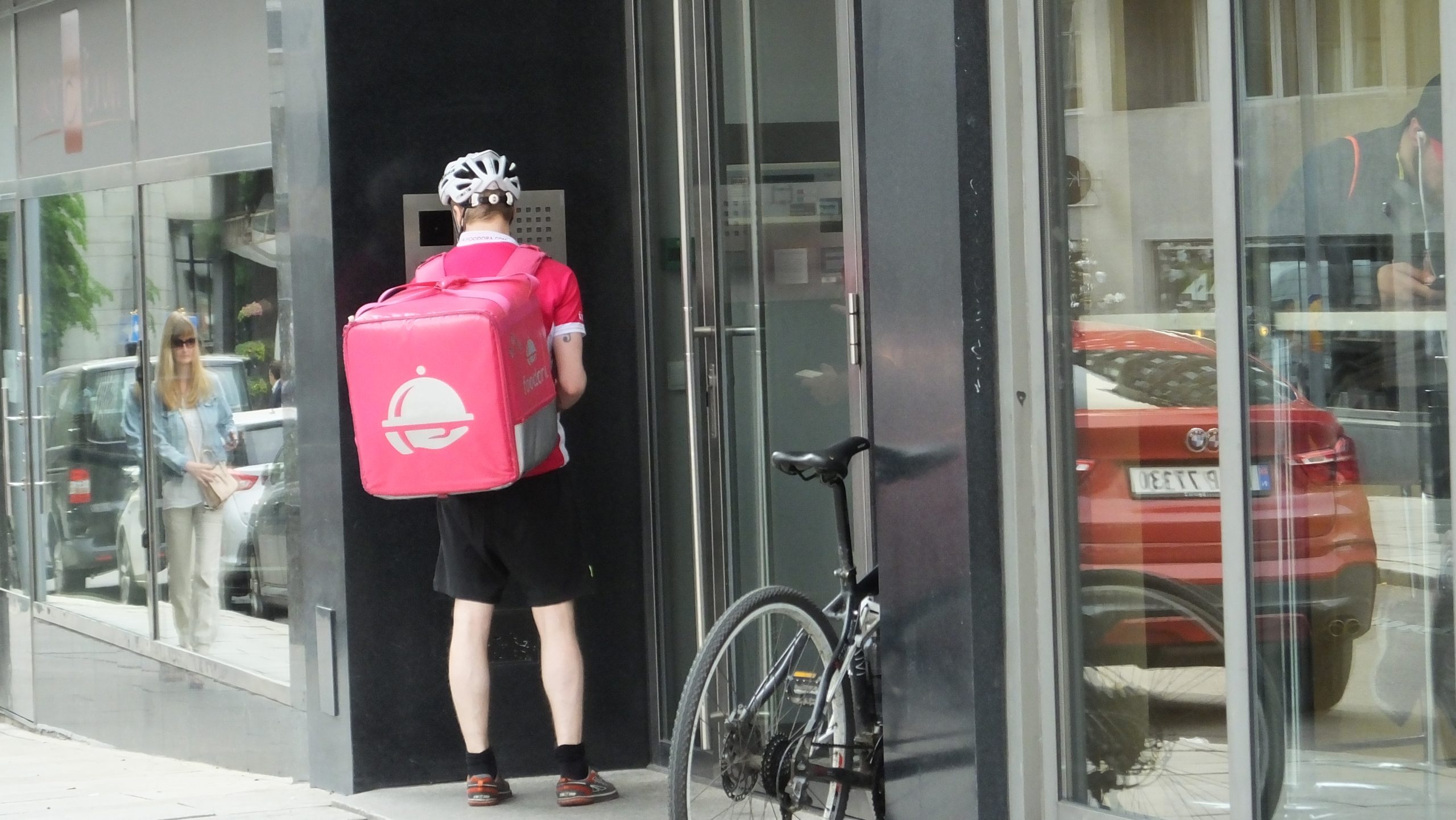Foodora and Wolt delivery bikers or drivers have become a common sight in Norway’s biggest cities. The same goes for taxis from Uber and Bolt.
App-based services, be it food delivery or taxis, have been controversial ever since they appeared around 10 to 11 years ago. They have challenged existing power and job structures in the labour market.
Platform work
Platform work entails performing tasks that are mediated through an app, often with no contact with a physical employer. Uber was the first platform company to arrive in Norway in 2014, followed by Foodora in 2015.
The biggest sector in the platform economy is now app-based food delivery. Around 2.2 million people across Europe work in the sector.
An estimated 2,000 people work as couriers via an app in Norway. 25 per cent of them were born in Norway.
There is a predominance of labour immigrants among people who have platform work as their main source of income.
(Source: Foreign labour and app-based food delivery services, Fact sheet from Fafo Østforum)
Some see them as a flexible opportunity to earn some extra money while studying. For others, they are a way into the labour market.
“It is the last low threshold job you can get in Norway,” Wolt’s head of communications, Christian Kamhaug, has told NRK.
Yet many of the platform companies have been criticised for offering something different from the traditional Norwegian job structure. People work long days for uncertain pay and run a high risk of being exploited.
As a rule, the couriers are self-employed and not employees. With few exceptions, they are not unionised.
Police: Criminals working as couriers
In early June, NRK ran a story quoting police saying organised crime syndicates bring drivers from Romania to Oslo to work as food couriers for Foodora and Wolt.
“These are often vulnerable people who come to this country and are exploited. This might well include cases of human trafficking,” Oslo police officer Lasse Johnsen told NRK.
Foodora and Wolt said they were not aware of these issues and have introduced measures to stop it from happening.
NRK and other Norwegian media have followed up with stories about what it is like to work for digital platforms like Foodora, Wolt, Uber and Bolt.
Studying platform work
Over the past decade, “platform work” has become an established field within labour market research. Fafo researchers Sigurd M. Nordli Oppegaard and Kristin Jesnes have studied the taxi industry and food delivery sector, respectively.
They have presented findings from their doctoral thesis on several occasions, including at a seminar organised by Fafo Østforum in June and during Arendalsuka in August this year.
Fafo researcher Sigurd M. Nordli Oppegaard says that taxi drivers in Norway faced long days and unpredictable working hours even before the arrival of Uber and Bolt. It is also nothing new that many taxi drivers face the dilemma of enjoying the work itself while wanting better working conditions.
But when app companies arrived in Norway, competition became harder and conditions deteriorated, according to the researchers.
Nordli Oppegaard concludes that the taxi platforms have gained a foothold in Norway by circumventing rules that normally apply in the labour market. According to him, this gives them a huge amount of power over the taxi market in the major cities – and over the drivers’ working conditions.
What now for the taxi industry?
The traditional taxi industry and the trade union movement welcome the app companies – but only on equal terms.

Limits on the number of licenses are common in many countries, and the same goes for price regulations – also for app-based operators.
“I think this is the way forward in Norway too,” says the Fafo researcher.
“But is this enough? Will simply limiting the number of licences work? Or does the current situation in the Norwegian taxi industry offer a historic opportunity to create regulations that will secure a market with better wages and working conditions than what existed in 2019?
“Because the problems began way before that. Could we use this opportunity to think in new ways?” wonders Nordli Oppegaard.
Want an industry deal – might emerge soon
Fafo researcher Kristin Jesnes has investigated the Norwegian food and retail industry and studied the power dynamics in the app-based food delivery sector.
She explains that during her doctoral research, her analysis shifted from “yes, the platforms can be integrated into the Norwegian labour market model” to “perhaps not quite so easily”.
-
Oslo Foodora riders on strike
4 minutes
She believes the revelations around organised crime using Wolt and Foodora show that app-based food delivery has entered a new phase in Norway.
While courier jobs used to be attractive for students wanting to earn some extra money, the work has now been taken over by foreign workers – people in vulnerable situations who are at risk of being exploited.
“It is important to remember that companies carry a responsibility for how they impact human rights and working conditions throughout the entire supply chain, and how this is managed. This also challenges us as consumers and the Norwegian labour market model,” believes Jesnes.
What will happen in the future?
The researcher points to measures included in the government’s new action plan against social dumping, the fact that the EU platform work directive is on its way into the Norwegian labour market and that the Norwegian Labour Inspection Authority has been given more resources and tools.

“At the end of the day, the companies are the ones with the responsibility. Perhaps it is time for an industry agreement? The absence of such an agreement is what has led to competition over wages and working conditions,” says Jesnes.
Industry players confirm that work is underway to establish such an agreement.
Measures to give platform workers more power
The government’s new action plan against social dumping and labour crime aims to strengthen protections for those who work via digital platforms, according to Tonje Brenna, the Minister of Labour and Social Inclusion.
The new action plan presents 10 brand new measures and 7 measures that will receive intensified focus.
“Employers should not be able to organise themselves away from their responsibilities, and no one should be forced into being classified as a false self-employed contractor.
“The government is not currently considering introducing new intermediate solutions between being an employee and self-employed,” said Tonje Brenna during the action plan launch.
Central measures in the action plan
- Strengthen workers’ rights when working for digital platforms
- Proposed changes to immigration regulations to prevent the exploitation of foreign workers
- Expand and tighten criminal provisions in the Immigration Act for the improper exploitation of foreigners in work and housing
- Measures against wage theft – evaluate the criminal provisions
- More effective use of analysis and intelligence from the National Interagency Analysis and Intelligence Centre – will be possible to use in concrete cases
- Strengthen and further develop interagency cooperation, enhance the ability to share information and secure a good balance between operational work, intelligence, and knowledge-building
(Source: Action Plan Against Labour Crime and Social Dumping)
She points to the introduction of HSE cards that will have a direct impact on those who drive using digital platforms.
“The authorities can better monitor the trade, and it will become easier to crack down on breaches,” according to the government minister.
Only three years since the previous plan
The new action plan against social dumping and labour crime was presented by the government in early August.
The previous action plan was published in 2022. According to the Minister of Labour and Social Inclusion, Tonje Brenna, most of the measures introduced back then have been implemented.

But the serious labour market is still being challenged by players who exploit parts of the new labour market for illegal purposes.
“The action plan against labour crime and social dumping follows up on this development. Several of the measures are aimed at foreign workers and others in particularly vulnerable positions,” Brenna says in a press release.







